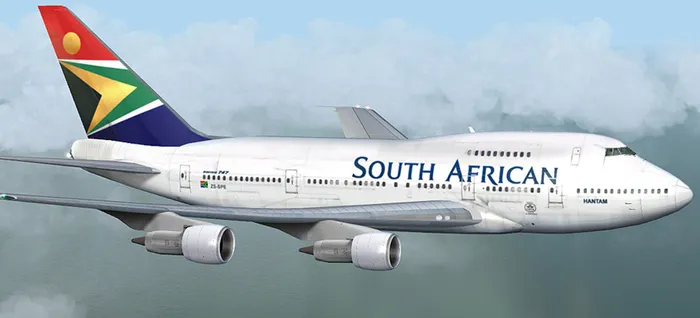Vouchers, refunds: Airlines want compromise

Picture: Supplied. Picture: Supplied.
The Covid-19 lockdown has thrown the country into turmoil and while government ministers flip-flop on the taxi sector, the definition of “basic goods”, funerals and whether street vendors are allowed to earn a living, businesses are going bust and misery is growing.
So too are anger and frustration - in recent days, my inbox has been flooded with complaints about airlines and other travel sector providers refusing refunds, which constitutes a violation of the Consumer Protection Act.
But these are no ordinary times and the hospitality sector, in particular, has taken a massive knock. Many restaurants that closed last month are unlikely to reopen, putting vast numbers of people out of work, which is why Dineplan’s voucher system is a worthy initiative that deserves support.
Truth is, for South African business the picture is dismal. And the situation is certainly unprecedented.
The travel bans and restrictions have given travellers no choice; airlines, agencies, cruise operators, accommodation providers and other suppliers in the sector are fighting for survival.
And consumers, under significant pressure, are rightly upset about the responses from some suppliers, because by now, there is some awareness of the CPA’s position on refunds.
The travel bans have resulted in cancellations of flights, accommodation and events, but consumers have been urged to defer their plans in order to protect suppliers and their staff, who are at risk of losing their livelihoods.
Consumer Goods and Services Ombudsman Magauta Mphahlele has spoken about consumer protection laws striking a balance between the rights of consumers and suppliers, and that her office empathises with businesses who stand to carry massive losses due to cancellations.
“Therefore, we urge all parties to act reasonably and fairly as well as work together to minimise the impact on the economy, individuals and households. We also hope that our government will consider some relief measures for suppliers to stem potential job losses and the collapse of the economy,” she said.
Ordinarily, where the CPA allows for full refunds on cancellations, consumers should rather postpone to minimise the impact on suppliers, and the ombud advises suppliers to treat each case on its merits and develop incentives to encourage consumers to accept the postponements where possible.
The sector has not been blind to the issue of refunds though.
Kirby Gordon, the chief marketing officer for Safair, says vouchers have been a matter of intense debate.
“Safair, along with all other local airlines, are following the same process of issuing vouchers,” Gordon says. “It is a matter that both the International Air Transport Association (Iata) and the Airlines Association of South Africa are actively working on.”
Gordon says the industry has been incredibly hard hit by the pandemic, both operationally and financially.
“Most recent updates from Iata put the cost to South African aviation at $2.29 billion (R42.11bn), with 186850 jobs on the line. Many of South Africa’s most prominent airlines have initiated Section 189 retrenchment processes.”
In an open letter to travel agents, Iata’s chief execrative Alexandre de Juniac says a third of the global fleet is parked, and they estimate that revenue from passenger ticket sales will fall 44% this year compared to last year.
“There simply is no precedent for what our members and you, our travel agent partners, are experiencing,” he says.
“As the operator of industry financial settlement systems that in normal times processes more than
$1.25 billion in industry funds every day, Iata faces the enormous responsibility of maintaining the security and integrity of these systems during a period when far more cash is exiting than is coming in.
“At the same time, we know that our members and business partners rely on us to recognise the extraordinary challenges they are facing and to show as much flexibility as possible under the circumstances.”
On the issue of airlines withholding ticket refunds, or issuing vouchers in lieu of refunds, De Juniac says: “Our industry is experiencing a critical liquidity crisis. Most airlines are spending more cash in reimbursing their passengers than they receive in new booking revenues. We recently estimated the industry’s liability in this area at $35 billion. In this context, airlines’ most urgent need is to keep their remaining liquidity to pay salaries and face their fixed travel value chain operating in the short time that airlines have before facing bankruptcy.”
He says the best answer is for regulators to ease requirements for cash refunds and allow airlines to issue vouchers instead.
“This would remove the pressure that is on agents to issue cash refunds at a time when airlines are making decisions based on their own need to preserve cash. Iata is willing to engage in open and collaborative discussions with the travel agency community represented in the Passenger Agency Programme Global Joint Council to formulate a structure for these vouchers that will bring value for airlines, travel agents and consumers.
“People want to travel, for the horizons it broadens and the connections it enables and maintains. These are dark days for our industry, but we are resilient, and we will get through them, together.”
While vouchers have been the preferred refund method, in exceptional circumstances, most suppliers are open to negotiation.
If you feel a company is not listening to you, get in touch with me via email, Twitter or my Ask Georgie Facebook page.